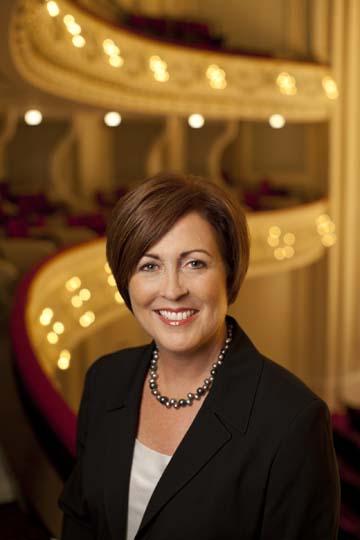Kennedy Center Names First Female President
By • December 19, 2013 0 1427

When Deborah F. Rutter, president of the Chicago Symphony Orchestra Association, was introduced as the next Kennedy Center president—succeeding outgoing president Michael M. Kaiser Sept. 1—she was asked at a Dec. 10 press conference how it felt to be the first female president of the center.
“Well, I haven’t been asked that question in a long time,” she said. Kennedy Center Chairman David M. Rubenstein hastened to add that “we chose her because she was the best candidate.”
From the unanimously positive response to the news of her selection, and her credentials as a bridge-builder, collaborator, fund raiser and person of vision, that appears to be a self evident fact. But the issue of Rutter’s gender isn’t really an issue, but another welcome sign of the coming of like-minded and visionary, pragmatic female leaders in Washington’s cultural and institutional environment. Rutter’s selection makes her one of the most high-profile leaders among the Washington areas’s cultural institutions.
Jenny Bilfield, named earlier this year as president and chief executive officer of the Washington Performing Arts Society—the areas’ long-time and premiere performance presenter—said she was “thrilled to hear the news.”
“I don’t know her personally, but I certainly know of her and I know we share thoughts about the role of cultural institutions in the community and about education and outreach and collaboration with other institutions. I’m also intrigued by the fact that we are both married to musicians and we both have teenage children. I’m looking forward to having a rich relationship with her. Everything I’ve heard is she is forward looking, reaches out to people and to community and is a superb collaborator. It’s just really, really exciting news.”
The Washington area has experienced a recent growth in female leaders in the performance arts community that includes Bilfield, Washington Opera artistic director Francesca Zambello, Suzanne Farrell, also at the Kennedy Center, Baltimore Symphony Orchestra conductor Marin Alsop and now Rutter.
“I think this is very welcome news for Washington to have such a talented and able person come to this city to head the Kennedy Center,” said Judith Terra, chair of the DC Arts Commission. “She has an outstanding reputation as a leader in Chicago. We welcome the news of her appointed and we welcome here to the city and the arts community.”
“You realize,” a reporter told her, “that you have a pretty tough act to follow.”
“I know that,” she said. “It’s an honor and a challenge to continue to build on the tremendous work that Michael Kaiser has done here for the past 13 years.”
“I believe in engaging the center with the community we serve here,” Rutter said. “I think all Americans—who live in our country—should have access to the arts, and all artists should be engaged as “citizen artists”, contributing to our culture and our communities. As the living memorial to John F. Kennedy as a home to art and artists, the Kennedy Center must not just reflect back on the past, but look forward to the future. We must engage our audiences here in this place and expand our reach beyond these walls, taking advantage of new technologies and building on the current educational and community programs.”
Rutter will be the third president of the Kennedy Center, succeeding Kaiser, who served for 13 years and will serve until Aug. 31. Roger Stevens was the first president of the center.
Rutter has been president of the Chicago Symphony Orchestra for the past ten years, a tenure that saw her persuasive powers at full display by getting the renowned Italian conductor Ricardo Muti to come to Chicago and head the orchestra in 2010. She introduced an innovative performance program called Beyond The Score, and instituted stronger outreach to the community, with a policy she called “citizen musicianship” and a program with the CSO’s Institute for Learning, Access and Training. Rutter not only brought patrons to the orchestra, but brought the orchestra and music to the community.
A Stanford graduate, Rutter was also executive director of the Seattle Symphony, where she erased a deficit, tripled the annual budget and grew its endowment six-fold.
It’s been a successful career, but running the Kennedy Center is still a major step forward in responsibilities, scope and sheer size. She’ll be overseeing the Center’s $100 million expansion, and will be running a center that includes not only the merged NSO and the Washington National Opera, but also theater, dance, ballet, and jazz.
Rutter received high praise from Kaiser. “Deborah is smart, creative, kind and experienced. I cannot imagine anyone in whom I would have more confidence to lead the center.”
“The Kennedy Center is fortunate to have found in Deborah an individual with an undeniable passion for an knowledge of the performing arts; a long, well-respected track record of managing and enhancing performing arts organizations and a commitment to making the performing arts accessible and appealing to people of all ages and background,” Rubenstein said.

